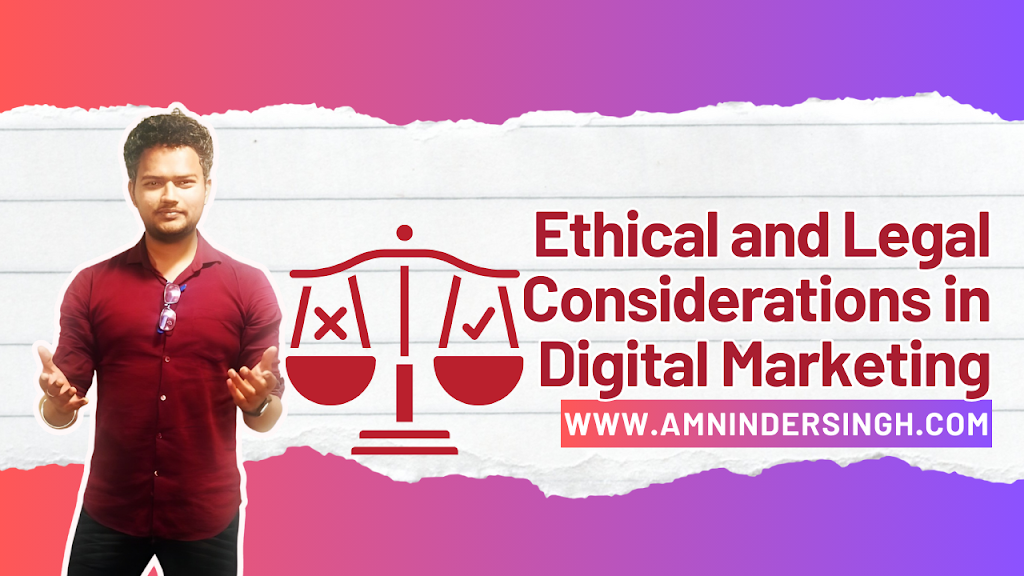Digital marketing has become an indispensable part of modern business strategies, offering unparalleled opportunities to connect with audiences worldwide.
However, the ever-evolving digital landscape brings with it a host of ethical and legal considerations that marketers must navigate to ensure both success and compliance.
This comprehensive guide explores these considerations and offers practical insights for ethical and legally sound digital marketing practices.
Understanding the Power of Digital Marketing
Digital marketing has revolutionized how businesses engage with their target audiences. It enables marketers to reach potential customers globally, gather valuable data, and customize campaigns with unprecedented precision.
While this accessibility and reach offer enormous benefits, they also raise ethical and legal challenges that must be addressed.
Ethical Considerations
1. Privacy Concerns
Privacy is a paramount ethical concern in digital marketing. As businesses collect vast amounts of personal data from users, they must uphold the highest standards of data protection.
Adhering to privacy regulations like the General Data Protection Regulation (GDPR) in Europe and the California Consumer Privacy Act (CCPA) is crucial.
Marketers should obtain explicit consent for data collection, provide clear privacy policies, and allow users to opt out of data sharing.
2. Transparency and Honesty
Maintaining transparency and honesty in digital marketing is essential. Marketers should ensure that their online advertisements and content accurately represent their products or services.
Misleading claims, fake reviews, and deceptive practices erode trust and can result in legal repercussions.
3. Social Responsibility
Digital marketers should also consider the social impact of their campaigns. Avoiding content that promotes hate, discrimination, or harm is not only ethical but also aligns with the values of responsible businesses.
Supporting social causes in a genuine and non-exploitative manner can enhance a brand’s reputation.
4. Customer Engagement and Consent
Respect for customer engagement and consent is a fundamental ethical principle. Marketers should avoid spamming customers with unsolicited emails or messages.
Consent should be sought explicitly, and users should have the option to unsubscribe easily.
Building and nurturing positive relationships with customers should be the primary goal.
Legal Considerations
1. Compliance with Data Protection Laws
Data protection laws, such as GDPR and CCPA, have a significant impact on digital marketing practices.
Marketers must ensure they collect, store, and process personal data in compliance with these regulations.
This includes obtaining informed consent, providing data access, and promptly responding to data breaches.
2. Copyright and Intellectual Property
Respect for copyright and intellectual property rights is non-negotiable. Using copyrighted material without permission can lead to legal disputes.
Marketers should source images, videos, and content ethically and ensure they have the necessary rights or licenses.
3. Advertising Standards
Adhering to advertising standards and regulations is crucial to avoid legal complications.
Each region may have specific advertising guidelines, and marketers should familiarize themselves with these rules to prevent misleading claims or unfair competition.
4. Email Marketing Compliance
Email marketing is subject to stringent regulations like the CAN-SPAM Act in the United States.
Marketers must include clear opt-out options, provide accurate sender information, and avoid deceptive subject lines when sending commercial emails.
Practical Steps for Ethical and Legal Digital Marketing
Comprehensive Training: Ensure that your marketing team is well-versed in digital marketing ethics and legal requirements.
Regular training and updates are essential to staying compliant.
Document Everything: Keep records of all consent forms, privacy policies, and communications with customers. This documentation can be invaluable in case of legal disputes or regulatory audits.
Regular Audits: Conduct regular audits of your marketing practices to identify and rectify any potential ethical or legal issues.
Legal Counsel: If in doubt, consult with legal experts who specialize in digital marketing to ensure your campaigns adhere to all relevant laws.
Stay Informed: Keep up-to-date with changes in data protection regulations, advertising standards, and industry best practices to adapt your strategies accordingly.
Ethical Oversight: Establish an internal ethical review board or process to evaluate campaigns for ethical considerations, especially when dealing with sensitive topics.
Navigating Ethical and Legal Considerations in Digital Marketing : Conclusion
In the digital age, ethical and legal considerations are integral to successful and sustainable digital marketing practices. Marketers must prioritize privacy, transparency, and social responsibility while ensuring compliance with data protection laws, copyright regulations, and advertising standards.
By adopting a proactive approach and adhering to these principles, businesses can build trust with their audiences, avoid legal issues, and thrive in the competitive digital landscape.

